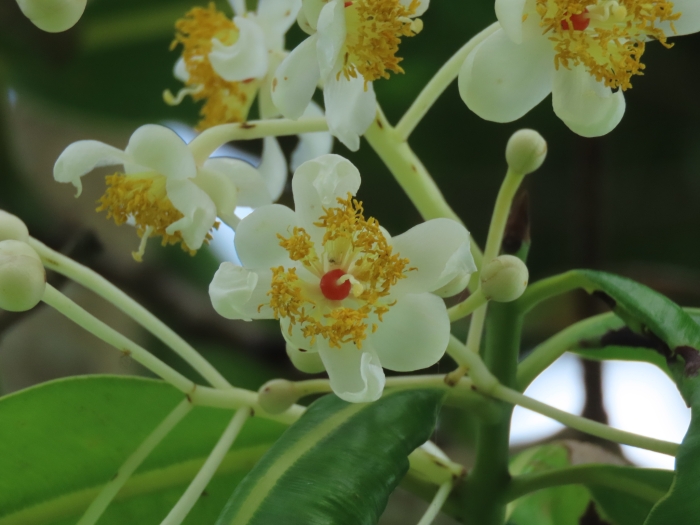Tamanu
(Calophyllum inophyllum)
Tamanu (Calophyllum inophyllum)
/
/

© chiuluan
CC BY 4.0
Image By:
© chiuluan
Recorded By:
Copyright:
CC BY 4.0
Copyright Notice:
Photo by: © chiuluan | License Type: CC BY 4.0 | License URL: http://creativecommons.org/licenses/by/4.0/ | Uploader: chiuluan | Publisher: iNaturalist |

























Estimated Native Range
Summary
Calophyllum inophyllum, commonly known as tamanu or beach calophyllum, is an evergreen tree that is native to coastal and lowland forests in tropical Asia and Wallacea. It is also found in East Africa, Australia, and the Pacific Islands, where it has been widely naturalized. This species typically grows to a height of 26-98 feet (8-30 meters) with a broad, spreading crown that can provide significant shade. The tree is notable for its dense foliage, glossy green leaves, and fragrant white flowers that bloom throughout the year in its native range. The flowers are followed by round, green fruits that turn brown as they mature, each containing a single large seed. The bark is dark and furrowed, adding to the tree’s ornamental value.
Tamanu is valued for its ability to grow in a variety of soil conditions, including sandy, clay, and degraded soils, making it an excellent choice for erosion control along coastlines. It is also used for timber and has a long history in traditional medicine, where oil from its seeds is used for skin ailments. In cultivation, it requires full sun to partial shade, moderate watering, and well-draining soil. While it is tolerant of salt spray and wind, it is not frost-tolerant and should be planted in warm climates. Due to its potential invasiveness, it is important to consult local regulations before planting tamanu outside its native range.CC BY-SA 4.0
Tamanu is valued for its ability to grow in a variety of soil conditions, including sandy, clay, and degraded soils, making it an excellent choice for erosion control along coastlines. It is also used for timber and has a long history in traditional medicine, where oil from its seeds is used for skin ailments. In cultivation, it requires full sun to partial shade, moderate watering, and well-draining soil. While it is tolerant of salt spray and wind, it is not frost-tolerant and should be planted in warm climates. Due to its potential invasiveness, it is important to consult local regulations before planting tamanu outside its native range.CC BY-SA 4.0
Plant Description
- Plant Type: Tree
- Height: 36-40 feet
- Width: 30-49 feet
- Growth Rate: Slow, Moderate
- Flower Color: White
- Flowering Season: Spring, Summer, Fall
- Leaf Retention: Evergreen
Growth Requirements
- Sun: Full Sun, Part Shade
- Water: Medium, High
- Drainage: Fast, Medium
Common Uses
Bee Garden, Bird Garden, Border Plant, Potted Plant
Natural Habitat
Native to coastal and lowland forests in tropical Asia and Wallacea, as well as East Africa, Australia, and the Pacific Islands
Other Names
Common Names: Beach Calophyllum, Ballnut, Borneo-Mahogany, Indian Doomba Oiltree, Indian-Laurel, Kamani, Beauty Leaf, Oil Nut Tree
Scientific Names: , Calophyllum inophyllum, Balsamaria bintagor, Balsamaria inophyllum, Calophyllum apetalum, Calophyllum bingator, Calophyllum bintagor, Calophyllum blumei, Calophyllum inophyllum f. oblongata, Calophyllum inophyllum f. obovata
GBIF Accepted Name: